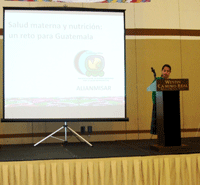The Health Policy Project ended in 2016. Work continued under Health Policy Plus (HP+) until 2022.
NEWS & VIEWS
September 22, 2011
Posted by Margaret Saunders
 |
|
Mrs. Teresa Caal, addressing candidates for the national congress, provides an overview of reproductive health and nutrition of indigenous women in Guatemala. Photo by Edlizar Castro.
|
GUATEMALA CITY—On September 2, the National Alliance of Organizations for Reproductive Health of Indigenous Women of Guatemala, ALIANMISAR, organized a public forum with candidates for the national congress to demand greater commitment for improving the reproductive health (RH) of indigenous women. Mrs. Teresa Caal, general coordinator for ALIANMISAR, alerted the candidates to the RH and nutritional status of indigenous women in Guatemala and in comparison to women in other Latin American countries.
In Guatemala, maternal and child deaths disproportionately affect the poor, rural, and indigenous populations. Mrs. Caal explained that improving access to family planning (FP), nutrition, and other RH and maternal health services will reduce the risks for complications during pregnancy and birth, reduce the number of low birthweight babies, and help to save the lives of women and children. Mrs. Caal also drew attention to the government’s political priorities outlined in the national budget and the actions required to comply with the country’s legal framework for maternal health and nutrition. In closing, she called on the candidates to increase financial resources to improve quality and access to health, education, and nutrition services with an intercultural focus to better reach indigenous populations.
Eight congressional candidates participated in the forum. Each candidate was invited to describe how they would promote the reproductive health and nutrition for underserved populations and improve financing for these programs. At the conclusion of the event, the candidates signed a letter confirming their intention to finance and promote the fulfillment of legal obligations to improve reproductive and maternal health and nutrition, and to work with ALIANMISAR to monitor progress in meeting the health needs of indigenous women.
This event, which garnered local media coverage, is one in a series designed to raise awareness of reproductive health and family life issues during the electoral process in Guatemala. It also reflects the growing influence indigenous women are having on the policy environment.
Since 2006, the US Agency for International Development (USAID)—through PASCA, the Health Policy Initiative, and Health Policy Project (HPP)—has supported initiatives to build capacity of indigenous women’s leaders and networks. Technical assistance has supported women to organize networks, strengthen knowledge of sexual and reproductive health issues, and analyze health inequities. As a result, indigenous women at the national and local levels have engaged in dialogue and advocacy to transform policies, increase financial resources for FP/RH programs, and encourage culturally-appropriate services for indigenous women.
In addition to ALIANMISAR at the national level, indigenous women’s networks have formed in several departmentos, including Alta Verapaz, Chimaltenango, Quetzaltenango, Quiché, San Marcos, and Sololá. The national alliance now consists of more than 90 organizations and actively participates in citizen monitoring, advocacy, and policy dialogue to promote better, more culturally-appropriate health services that are accessible to the indigenous populations, especially those living in rural areas and in poverty.
A key component of HPP’s new program in Guatemala will be to strengthen policy monitoring systems for networks, particularly for improved analysis and use of data for strategic planning and program monitoring. HPP will build on lessons from experiences with indigenous civil society groups to:
- Enhance systems for networking, coordination, and partnership among civil society groups;
- Improve communication and dialogue between NGOs and government; and
- Build leadership and planning capacity within civil society groups.
Stronger networks will facilitate active participation of women in the national dialogue to help ensure that programs are responsive to those most in need and government leaders are held accountable for achieving health and education goals. The networks will also support an increased role for civil society at the subnational levels in implementation and monitoring of policies, strategies, and action plans.
What's New
- Something to Build On: “Innovation Exchange” Celebrates the Health Policy Project’s Close and a New Beginning
- What Will it Take for Tanzania to Achieve ART Targets and Ensure Long-Term Sustainability of the HIV Response?
- Helping Kenya’s County Leaders Advocate for Increased Health Investments
- HPP Holds Working Meeting on Ensuring Responsible PEPFAR Transitions for Key Populations
- Health Policy Project Celebrates 2016 International Women's Day
- HPP Staff Participate in White House Conference on HIV Stigma Reduction

